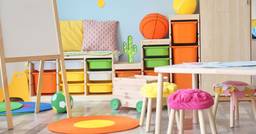How to Open a Licensed Childcare Center in Florida
Starting a licensed childcare facility in Florida is a meaningful opportunity to shape young lives and support families in your community. Turning this vision into reality requires not only a solid business plan, but a strong grasp of state regulations, licensing and training requirements, as well as facility and classroom staffing ratios. Whether you’re planning a small or large licensed daycare facility, following the below key steps will ensure you comply with the Florida Department of Children and Families (DCF) standards, setting your center up for success.
There are many different types of childcare providers, from a small family day care home to a multi-site child care business, so having an understanding of what license you need is a crucial first step. This blog is going to explore the licensing process for a licensed childcare facility in Florida.
Step 1: Understand the Licensed Child Care Facility Definition
According to Florida Statutes Section 402.302(2), a licensed child care facility is any program offering care for more than five children unrelated to the operator. It can be operated for profit or non-profit and must receive a payment, fee, or grant for the children receiving care.
However, certain entities are excluded from this definition:
- Public and nonpublic schools (with some exceptions).
- Summer camps and Bible schools.
- Operators of transient establishments such as resorts.
Step 2: Meet Age and Training Requirements
- Age Requirement: The facility operator must be at least 21 years old.
- Director Credential: The facility’s director must have an active Director Credential. This credential ensures that the director is trained in child development, leadership, and administrative duties.
- Staff Credential: Facilities that serve more than 20 children must have at least one credentialed staff member for every 20 children in care. Training for these staff members is essential for compliance.
Step 3: Complete Required Training
All child care personnel working in the center must successfully complete a 40-hour Introductory Child Care Training, divided into two parts:
- Part I (30 hours) covers topics such as child care rules and regulations, health and safety, identifying and reporting child abuse, child growth and development, and behavioral observation.
- Child Care Facility Rules and Regulations (RNRF – 6 hours)
- Health Safety and Nutrition (HSAN – 8 hours)
- Identifying and Reporting Child Abuse and Neglect (CAAN – 4 hours)
- Child Growth and Development (CGDR – 6 hours)
- Behavioral Observation and Screening (BOSR – 6 hours)
- Part II (10 hours) focuses on specialized training courses that cover developmentally appropriate practices, with specific courses for infants, preschoolers, school-age children, or children with special needs.
- Understanding Developmentally Appropriate Practices (UDAP – 5 hours) AND one (1) of the following:
- Infant and Toddler Appropriate Practices (ITPR – 5 hours)
- Preschool Appropriate Practices (PSPR – 5 hours)
- School-Age Appropriate Practices (SAPR – 5 hours) OR
- Special Needs Appropriate Practices (SNP – 10 hours)
- Understanding Developmentally Appropriate Practices (UDAP – 5 hours) AND one (1) of the following:
Additionally, staff working with school-age children can opt for a tailored introductory training program.
Introductory Training for Child Care Personnel Serving School-Age Children Only
Childcare personnel working in facilities serving school-age children exclusively or within multi-age facilities can fulfill the Part I and Part II Introductory Child Care Training requirements by completing the following courses. Each course requires the passage of a competency exam, and the online courses are available through the Child Care Training portal.
Part I: 28 Hours
- Child Care Facility Rules and Regulation (RNRF – 6 hours)
- Health, Safety, and Nutrition (HSAN – 8 hours)
- Identifying and Reporting Child Abuse and Neglect (CAAN – 4 hours)
- Understanding Developmentally Appropriate Practices (UDAP – 5 hours)
- School-Age Appropriate Practices (SAPR – 5 hours)
Part II: 12 Hours
Educators must meet this requirement by completing one of the following:
- Competency-Based Course Completion: School-Age Program Quality Standards and Self-Assessment (SALT – 12 hours)
- Specialized School-Age Training:Training provided by a national organization that includes competency demonstration through exams or portfolio assessments.
Additionally, all educators working in the licensed childcare facility must complete ongoing in-service training annually to maintain certification.

Additional Training Requirements
Literacy Training
All staff working with young children must complete a minimum five-hour course in early literacy and language development for children aged birth to five. This can be fulfilled through:
- Department web-based courses such as Early Literacy Birth to Three or Emergent Literacy for VPK Instructors.
- An approved literacy course from the Florida Early Literacy Language Development Course Approved List.
- A college-level early literacy course completed within the last five years.
Annual In-Service Training
After completing Parts I and II, educators must complete a minimum of 10 clock hours or 1 Continuing Education Unit (CEU) of in-service training annually, aligned with Florida’s fiscal year (July 1–June 30).
→ Lillio Academy offers high-quality, online professional development courses developed by experts with the needs of childcare providers in mind, helping educators earn their CEUs on the schedule that works best for them.
Pediatric CPR/First Aid Training
To maintain licensure, every facility must have at least one staff member with current certification in first aid and pediatric CPR on-site during operations and field trips. Training must include an in-person, instructor-led skills assessment documented by a certified instructor.
Safe Sleep/Shaken Baby Syndrome Training
Daycare centers with infant classrooms must have all infant providers complete training on safe sleep practices and shaken baby syndrome prevention. Options include:
- DCF Health, Safety and Nutrition (HSAN – 8 hours)
- DCF Safe Sleep Practices for Child Care (SAFE – 1 hour)
- Early Learning Florida’s Safe Sleep Practices (SSPELFL – 1 hour)
Fire Extinguisher Training
All childcare personnel must complete training in fire extinguisher use and operation. This training is not provided by DCF and must be obtained separately.
For more details about the training requirements, visit the DCF Child Care Facility Training Requirements.
Step 4: Background Screening and Legal Compliance
All child care personnel, including volunteers, must undergo and pass a background screening before being licensed, hired, or to volunteer in a child care facility. This screening is required for:
- Owners, operators, employees, and volunteers working in early childhood education.
- Enrichment service providers: Professionals like dance, karate, gymnastics, and music instructors who may enter the childcare facility.
Screening Components
- FBI and FDLE Background Checks
- All individuals must complete fingerprinting through the Background Screening Clearinghouse.
- Owners/operators must initiate the screening in the Clearinghouse before fingerprinting to avoid delays, invalid results, or additional costs.
- Guidance documents:
- Out-of-State Criminal Record Checks
- Required for individuals who lived outside Florida in the past five years.
- The FBI criminal history check covers states participating in the National Fingerprint File (NFF) program. List of NFF states.
- For non-NFF states, records must be sent to the Background Screening Unit.
- Child Abuse and Neglect Registry Checks
- Required for individuals who lived outside The State of Florida in the past five years. These checks include:
- Juvenile Records Check
- Child Care Attestation of Good Moral Character (AGMC)
- Employment History Checks
- Central Abuse Hotline Record Search (CAHRS)
- Mandatory Abuse and Neglect Reporting Requirements Form
- Required for individuals who lived outside The State of Florida in the past five years. These checks include:
Step 5: Facility Requirements
The facility must meet certain space requirements:
- A minimum of 35 square feet of usable indoor floor space per child.
- An outdoor play space of at least 45 square feet per child for half the licensed capacity.
- Bathrooms: Facilities with 1-15 children must have at least one toilet and one wash basin; for every additional 30 children, more toilets and wash basins are required.
The licensed capacity of your facility is determined based on these factors, including the indoor and outdoor space, sewer/septic capacity, and the number of toilets available.
Step 6: Staff-to-Child Ratios
To ensure proper care, Florida requires specific staff-to-child ratios:
- Infants (0-1 year): 1 staff member for every 4 children.
- 1-year-olds: 1 staff member for every 6 children.
- 2-year-olds: 1 staff member for every 11 children.
- 3-year-olds: 1 staff member for every 15 children.
- 4-year-olds: 1 staff member for every 20 children.
- 5 years and older: 1 staff member for every 25 children.
For mixed-age groups, the ratio is based on the youngest child’s group.
Step 7: Additional Services and Considerations
While not mandatory, a daycare business may choose to offer additional childcare services to enhance their offerings:
- Transportation: If your facility provides transportation, ensure your vehicles meet safety requirements and drivers are trained in First Aid and CPR.
- Food Preparation: Facilities providing meals must meet the state’s food hygiene standards.
- Infant Care: If caring for infants, cribs must meet specific safety standards, and no double or multi-deck cribs are allowed.
- Night care: Night care refers to child care arrangements that are offered between 6:00 p.m. and 7:00 a.m. Here are the key requirements:
- Staff Availability: Caregivers must stay awake at all times while children are present.
- Safe Sleeping Arrangements: Each child must have their own clean, sanitary bedding for sleeping.
- Permitted Bedding: Beds, cribs, or mattresses are acceptable. Air mattresses and foam mattresses are not allowed.
Step 8: Apply for Your License
To apply for a childcare facility license, follow these steps:
- Contact your local child care licensing office for guidance.
- Complete the online application through the CARES system. An application fee of $1 per child based on the licensed capacity with a minimum charge of $25 and maximum charge of $100 for both initial applications and annual renewals. The licensed capacity will be determined by your local child care licensing office. The amount of the application fee will be given to you.
- Once all requirements are met, your local licensing agency will process your application and assign a licensed capacity.
Grants for Child Care Centers in Florida
There are various grants available to assist with the startup or expansion of childcare facilities in Florida:
- Child Care Tax Credits Program: Established in 2024, this program offers tax credits to businesses that establish, operate, or make payments to eligible childcare facilities for their employees. The credits apply against several Florida taxes, including corporate income and insurance premium taxes. Applications are processed by the Florida Department of Revenue.
- The Florida Child Care Development Block Grant is the primary federal grant program that allows states to provide child care assistance to low-income working families with children under age 13. The grant offers funding for improvements, training, and services to enhance childcare quality.
- U.S. Small Business Administration (SBA) Support: The SBA provides resources to help childcare businesses start and expand. This includes access to Women’s Business Centers, which offer training, counseling, and assistance in areas like business planning and financial operations. Additionally, the SBA offers various loan programs, such as the CDC/504 Loan Program and microloans, which can provide necessary capital for your childcare business.
- The School Readiness Program provides financial assistance to eligible low-income families to help them access quality childcare.
These grants can help reduce startup costs and ensure that your facility meets the highest standards of care.
Build Your Business with Lillio
Opening a licensed childcare facility in Florida is an exciting journey that allows you to positively impact families and children in your community. From Broward to Sarasota, communities in Florida need quality daycare providers to support working families. By leveraging grants and programs designed for new childcare facilities, you can reduce startup costs and focus on providing exceptional care. With preparation and dedication, you’ll be ready to offer a trusted resource for families and help children thrive during their most formative years of age.
After successfully navigating Florida’s licensing process, the next step is ensuring you have the right tools to manage and grow your program. Lillio is here to support you at every stage, offering comprehensive child care management software designed to streamline operations, foster parent engagement, improve record keeping and keep you compliant with state regulations.
Trusted by thousands of child care centers, Lillio provides the essential tools to help you create and sustain a high-quality program.
Opening a new licensed childcare facility in Florida? You don’t have to do it alone. Click here to discover how Lillio can make your journey smoother!
Maddie is a Registered Early Childhood Educator with a Master's in Early Childhood Studies. Her specialty is in Children's Rights and she is currently a Content Strategist for HiMama!
More by Maddie
Maddie Hutchison
February 6th, 2025
16 mins
Related Articles

The Benefits of Loose Parts Play for Young Children
December 10th, 2025 | Maddie Hutchison




